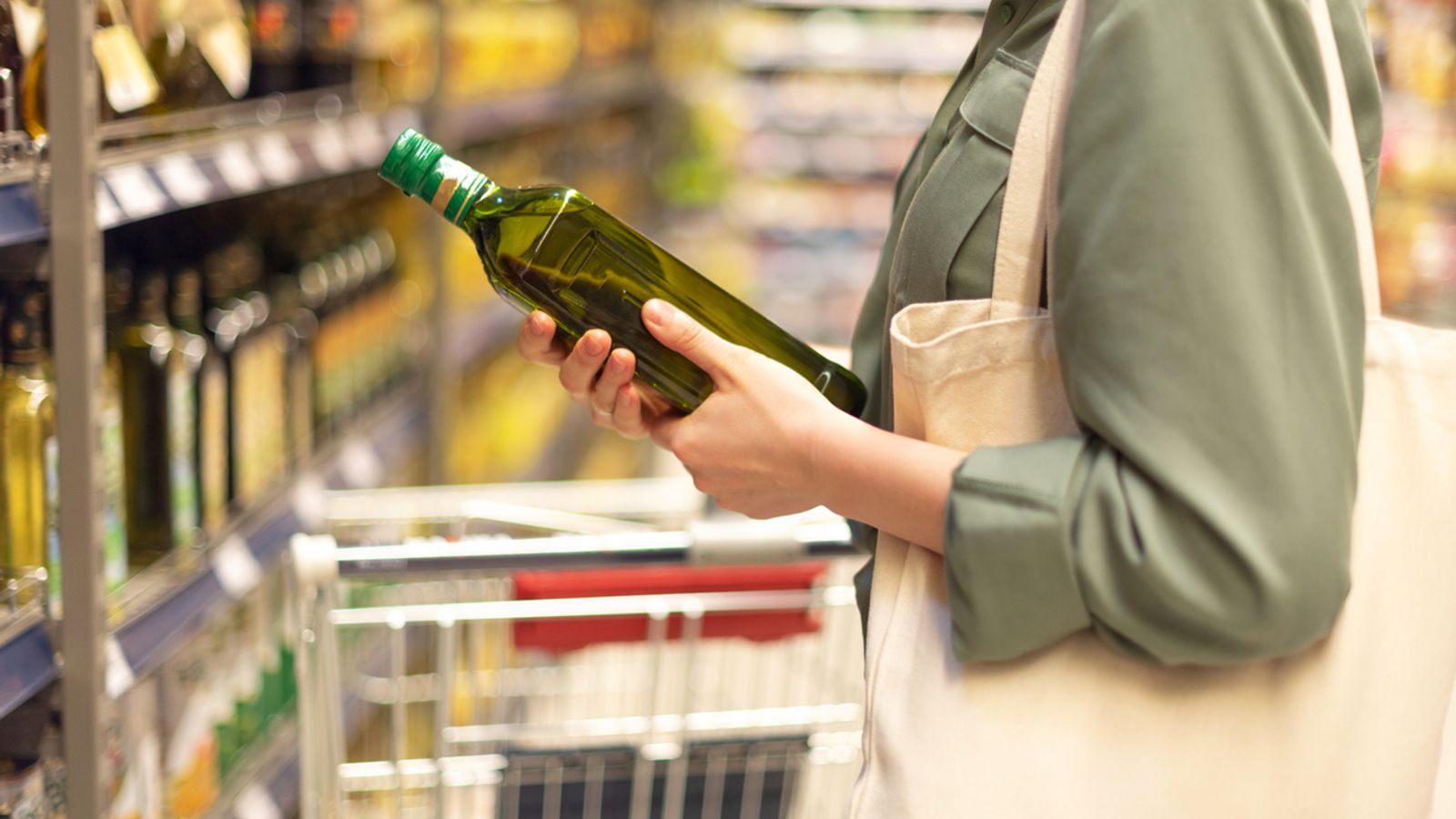This is a story about Spanish thieves, Italian farmers and British voters, and if that sounds like a set-up to a bad joke, that’s because in many ways it is.
Sky News analysis of official data shows that of all the items we put in our shopping baskets, none has gone up in price anywhere near as much as olive oil in the past three years.
Not sugar, which is 70% more expensive now than in January 2021. Not baked beans, 60.6%, and hard cheese if you were thinking about hard cheese (44.7%).
Our spending calculator reveals the average price of a 500ml bottle of olive oil has risen from £3.54 in January 2021 to £7.45 right now – an eyebrow-raising jump of 110.5%.
So how have we arrived at a place where olive oil is now the most stolen item in Spanish supermarkets, where Italians (Italians!) are increasingly using seeded oils instead and where Britons are… well, Britons are complaining a lot on social media…
We spoke to three people in the supply chain and discovered how a bacterial disease, criminal gangs, changing weather patterns and Brexit are all at play – and how it all means the olive oil currently on our shelves might not be as healthy as we think.
Groves becomes graveyards
We start in Italy, where, according to a survey by the polling firm Istituto Piepoli, 45% of consumers have rediscovered seed oil in the kitchen, and the industry is facing an existential crisis.
Mike Carlucci, managing director of the Italian food importer Tenuta Marmorelle, says production in parts of Italy is becoming impossible due to a natural disaster that has nothing to do with the climate.
“The events of the past 10 years have made olive oil production in Puglia [which produces 40% of Italy’s olive oil] almost impossible,” he said. “This is due to the rising bacteria disease Xylella Fastidiosa.”
The disease attacks and kills century-old olive trees, severely diminishing yields.
It spreads about 20km to 25km a year, Mike says, leaving a “graveyard of withered and barren trees which were once stunning beautiful olive groves”.
Many producers have been forced to replace their trees with more resilient varieties but…
“Even if the new trees manage not to succumb to Xylella, it will be at least nine to 12 years before they produce a notable amount of oil,” says Mike.
While prices are up across the continent, in the UK another factor is in play: Brexit.
“The cost of customs documentation leaving Europe and entering the UK is approximately £95 per shipment,” says Mike.
“Transporters have all imposed a Brexit surcharge for extra admin duties performed by them in the importation of goods from Europe.”
Pallets coming into the UK from the continent are now subject to more stringent fire resistance rules – meaning the cost of pallets has “tripled, even in some cases quadrupled”.
‘Never had a shortage like it’
Another issue, as has been widely reported, are the wildfires and droughts in southern Europe last year.
These weather events have lead people to extreme measures, according to Sarah Vachon, olive oil sommelier and founder of citizensofsoil.com.
“You can ask the elders in the villages in Greece and they’ve never had a shortage like this,” she says.
“I see lots of producers selling their previous harvest’s oils, since they’re able to get a high price for it and might have held on to it over the year.
“This means the consumer is not getting fresh EVOO. And when it’s not fresh, it not only loses its flavour, but it also loses a lot of the health benefits (namely antioxidants like polyphenols) which drop significantly over time.”
On top of climate change, there’s a flood of cheap sunflower oil coming from Ukraine – so while the price of olive oil is going up, the cost of alternatives are going down.
200 trees stolen overnight
The result is an industry in crisis – and organised criminals are taking advantage.
“Around half of the farmers I work with have a story to tell about thieves stealing their liquid gold,” says Sarah.
“Sometimes it’s the oil itself, or the olive fruit at the groves, or even an insane story from one of our producers about thieves coming in the night and uprooting 200 freshly planted trees.”
Maria Dawson, managing director of the organic food seller Clearspring, says the industry is seeing “some of the lowest levels of olive oil production for five decades and unfortunately a shortage of supply”.
The company has managed to secure a stable supply for the coming year, but Maria expects the market to remain uncertain – with no price reductions in the near future, even if 2025 brings better harvests.
Olive oil sommelier Sarah isn’t hopeful, either.
“Olive oil is already facing record prices, and the way the climate is changing across the Mediterranean basin (which is warming 20% faster than the rest of the world), the shortages we’ve seen will likely continue.”
Be the first to get Breaking News
Install the Sky News app for free
Six things to look for when buying olive oil if quality is key
This feature originally featured in the Sky News Money blog – your place for personal finance and consumer news.






















